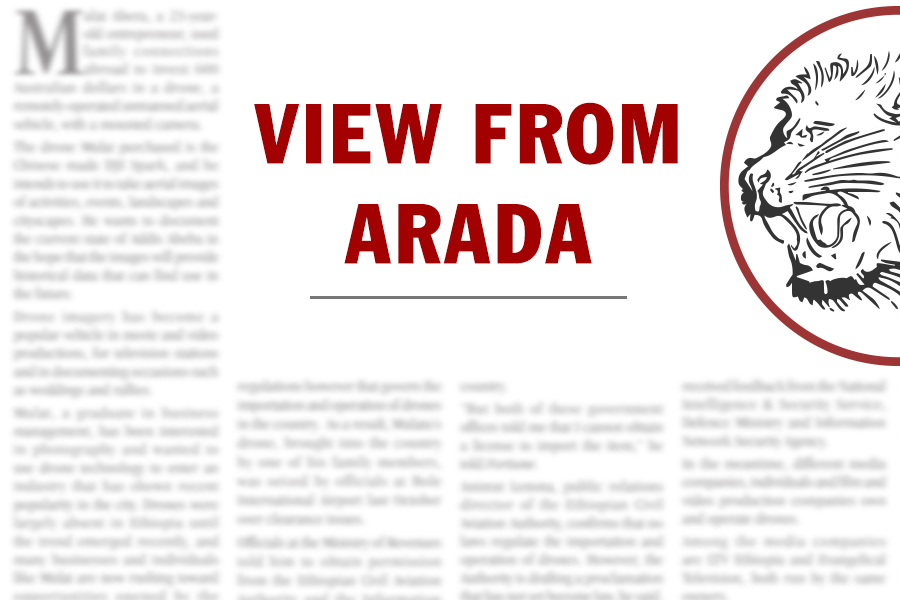
View From Arada | Oct 08,2022
Apr 4 , 2020
By Misikir Tilahun ( Misikir Tilahun is executive director of Africa Humanitarian Action, a non-profit organisation based in Addis Abeba that works to improve the wellbeing of communities in displacement settings in more than 20 African countries. He can be reached at director@africahumanitarian.org. )
With nearly a million confirmed cases in over 200 countries by the time this paper went to bed, the Novel Coronavirus (COVID-19) global pandemic continues to overwhelm the world. Africa’s first confirmed case surfaced in Egypt on February 12, 2020, followed by the first known Sub-Saharan case in Nigeria on February 28. At the time of writing, the Africa Center for Disease Control & Prevention (Africa CDC) has reported 6,213 confirmed cases in 49 AU Member States, with 221 deaths and 469 recoveries.
As governments across the continent look inward to roll out robust national response measures, they should include refugees, asylum seekers, migrants, stateless people, returnees and internally displaced populations in their strategies. The response to COVID-19 serves as yet another opportunity for African states to stand as examples of global solidarity and cooperation. Building on the 2019 African Union Theme of the Year, national responses to the pandemic should be anchored in member states’ commitments to find durable solutions to forced displacement.
In exercising their primary role of ensuring the safety of their citizens, governments should ensure that sweeping measures such as sealing borders should not apply to refugees fleeing conflict and persecutions. Exceptions should be put in place to facilitate the safe entry and processing of asylum applications. Denying asylum proceedings, which are guaranteed under international and African legal instruments, threatens the wellbeing and safety of thousands seeking protection.
Forcibly displaced populations worldwide are among the most vulnerable to be impacted by the pandemic. The case in Africa, home to more than 17.7 million internally displaced persons (IDPs) and over 6.3 million refugees, is no different. Refugees and IDPs - whether in camps, settlements or densely populated urban settings - tend to live in overcrowded households. They have limitations to access basic services and often do not have access to reliable information communication networks. These conditions are further exacerbated in countries already tackling other sources of instability such as conflict, adverse climate change and food insecurity.
Experience from the West Africa Ebola epidemic shows that vulnerable and marginalised populations, regardless of their place of origin, stand to bear the worst of a virus outbreak. COVID-19 does not respect borders, nor does it favour to infect the citizens of one nation over others. Thus, the response by African nations should be comprehensive, encompassing the most vulnerable, and rejecting discriminatory actions and xenophobic tendencies. This is the time for public health and national security officials across the continent to stand in unison and include the most vulnerable - citizens and neighbours alike.
Adopting a whole-of-community approach is in the self-interest of governments. This week, setting a good example of blending humanitarianism in domestic public policy, Portugal temporarily granted migrants and asylum seekers “full citizenship rights,” allowing them access to the country’s health services as the outbreak of the Coronavirus escalates. These type of inclusive national policies recognise that failure to combat the virus in the communities most in need will likely pave the way for its return to the mainstream.
Multiple humanitarian appeals have been launched by national governments. Last week, African ministers of finance called for a coordinated COVID-19 response, underscoring the need to strengthen immediate frontline health responses and calling for an emergency economic stimulus of 100 billion dollars.
Ethiopia’s Prime Minister Abiy Ahmed (PhD) urged G-20 leaders to help Africa cope with the pandemic by facilitating debt relief and providing 150 billion dollars in emergency funding. The UN for its part is seeking over two billion dollars to fight the virus in the world’s poorest countries, including some 22 African nations.
As these and other resources are allocated to COVID-19 response efforts, African policymakers should be guided by the virtues of humanity and compassion. All nations must continue to uphold their commitments to receive, protect and assist the continent’s forcibly displaced populations, especially now more than ever.
We are all in it together.
PUBLISHED ON
Apr 04,2020 [ VOL
21 , NO
1040]

View From Arada | Oct 08,2022

Commentaries | Sep 21,2024

Radar | May 25,2019

Life Matters | Apr 02,2022

Radar | Feb 15,2020

Dec 22 , 2024 . By TIZITA SHEWAFERAW
Charged with transforming colossal state-owned enterprises into modern and competitiv...

Aug 18 , 2024 . By AKSAH ITALO
Although predictable Yonas Zerihun's job in the ride-hailing service is not immune to...

Jul 28 , 2024 . By TIZITA SHEWAFERAW
Unhabitual, perhaps too many, Samuel Gebreyohannes, 38, used to occasionally enjoy a couple of beers at breakfast. However, he recently swit...

Jul 13 , 2024 . By AKSAH ITALO
Investors who rely on tractors, trucks, and field vehicles for commuting, transporting commodities, and f...

Jun 28 , 2025
Meseret Damtie, the assertive auditor general, has never been shy about naming names...

Jun 21 , 2025
A well-worn adage says, “Budget is not destiny, but it is direction.” Examining t...

Jun 14 , 2025
Yet again, the Horn of Africa is bracing for trouble. A region already frayed by wars...

Jun 7 , 2025
Few promises shine brighter in Addis Abeba than the pledge of a roof for every family...